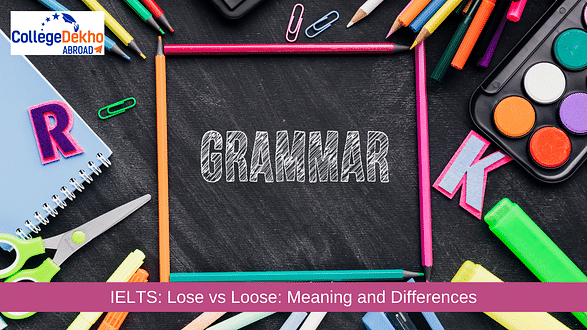Loose vs Lose: Are you studying for the IELTS exam and wish to avoid getting confused about English vocabulary? The difference between loose vs lose is a frequent cause of misunderstanding.
Although these two terms seem similar, they have different meanings and applications. Understanding their subtleties is important for your exam success. In this Grammar 101 article, we will look at the key differences between two English words: loose vs lose and why they matter for IELTS success. We will look at the importance of using the proper word in the right situation, from vocabulary accuracy to contextual awareness.
Whether you are working on the writing, speaking, reading, or listening sections, this knowledge can help you improve your language skills and prevent expensive blunders. So, let us unveil the meaning and differences between loose vs lose and prepare to ace the IELTS test with confidence and accuracy!
Meaning of ‘Loose’
The context determines the several meanings of the word 'loose'. Here are a few such definitions:
-
Not Tightly Tied: When anything is said to be ‘loose’, it signifies that it is not firmly fastened. For instance, loose clothes do not fit the body tightly or snugly.
-
Not Compact or Dense: Something that is loose is neither tightly packed nor dense. Loose gravel or dirt, for instance, is not tightly compacted.
-
Not Exact or Accurate: ‘Loose’ may also be used to indicate anything that is lacking in both. A loose estimate or loose translation, for instance, could not be precise or in-depth.
-
Not Rigid or Strict: The term ‘loose’ may also be used to describe something that is not closely regulated, rigid, or rigorous. A loose timetable or organisation, for instance, suggests flexibility and a lack of rigid norms.
-
Without Restriction or Confinement: Being ‘loose’ can refer to being liberated from limitation, imprisonment, or other forms of restraint. It could signify a lack of restraint or a feeling of emancipation.
What IELTS Score Do You Need to Study Abroad?
Meaning of ‘Lose’
Generally speaking, the word 'lose' refers to losing control of something or being unable to find or locate something. Here are a few typical meanings and applications of the term:
-
To Not be Able to Find: When you 'lose' something, it refers to either ceasing to have it or being unable to find it. For instance, you could misplace your keys, drop a game, or forget the time.
-
Not Have Anything or Someone You Want: To 'lose' something or someone also means to be deprived of that item or person. For instance, you may lose your job, a buddy, or a chance.
-
Failure to Win: The term 'losing' can be used to describe going down in a competition or other event. You may lose a race, a match, or a game.
-
Experience a Decline or Decrease: The word 'lose' might be used to indicate doing so. You could lose momentum, money, or weight, for instance.
-
Failure to Maintain: 'Losing' may also refer to a failure to keep something. For example, you could lose your anger, your concentration, or your line of thought.
Also Reads:
Difference Between Loose vs Lose
Although the words 'loose' and 'lose' may seem and sound similar, they are not the same. For all aspiring IELTS candidates, the following is a full explanation of the difference between loose vs lose:
-
When something is loose, it means that it is not tightly bound, fastened, or constrained. It denotes a lack of hardness, restraint, or tightness. Here are several instances of the word ‘loose’ in use:
-
Loose grip: Holding something with a relaxed or not tightly grasped hand.
-
Loose garment: Clothing that is not tight or snug.
-
Loose hair: Hair that is not tied or held in place.
-
-
The word ‘lose’ indicates ‘to no longer own’ something as well as to fail to acquire or hold onto something. It alludes to the act of losing, being without, or failing to keep something up. Here are a few examples of the word ‘lose’ in use:
-
Lose keys: To lose or fail to locate one's keys.
-
Lose a game: It is to come up short in a contest or game.
-
Lose concentration: Be unable to pay attention or concentrate.
-
In a nutshell, the key difference is that 'loose' is an adjective that denotes anything that is not tight or securely fixed, but 'lose' is a verb that denotes the act of losing, being deprived of, or failing to maintain something. Remember to use the right phrase and pay attention to the spelling and context.
When to Use Loose vs Lose in a Sentence?
It's necessary to understand when to use loose vs lose in an expression or sentence to prevent ambiguity and score well in the IELTS exam as well. To use these words appropriately, follow these suggestions:
Usage of Loose
Use the word loose to indicate something that is not tightly wound, hard, or restrained. For instance:
-
He has a loose T-shirt on.
-
It is necessary to tighten the loose screws.
-
Allen enjoys wearing clothes that are loose.
Usage of Lose
If you want to express the act of losing something, failing to win something, or being deprived of something, use the verb lose. For instance:
-
I did not wish to lose my chequebook once more.
-
The group wished to avoid losing the title match.
-
If Sara keeps being late, she risks losing her job.
Remember These Additional Tips
-
Pay close attention to how each word is spelt: "lose" has a single "o," whereas "loose" has a double "o."
-
Take your sentence's context into account. Does it refer to anything being tight or not tightly fastened (loose), or does it refer to something no longer existing or losing (lose)?
-
Verify that you have used the right term in each instance by proofreading your text.
You may correctly use the words loose vs lose in your sentences if you are aware of their meanings and situations.
Importance of Understanding Loose vs Lose for the IELTS Exam
For the IELTS exam, understanding the difference between loose vs lose is important for several reasons.
-
Vocabulary Accuracy: Your vocabulary range and precision are evaluated in the IELTS exam. Choosing the right term shows that you have a solid mastery of the English language. Making mistakes like confusing loose with lose might lower your vocabulary score.
-
Contextual Understanding: Your comprehension and interpretation of spoken and written English are assessed on the IELTS exam. You may more properly understand the content and aim of a text or discussion if you are aware of how to use the words loose and lose in context.
-
Writing Task: You must create logical and correct written answers in the IELTS writing module. Misuse of loose and loss can result in grammatical problems and reduce the clarity and consistency of your text.
-
Speaking Task: You must express yourself effectively and eloquently during the IELTS speaking module. The use of proper wording distinguishes your spoken English skills. Confusion between loose and lose can lead to misunderstandings and impede efficient communication.
-
Reading and Listening Comprehension: You will encounter diverse texts and audio recordings on the IELTS reading and listening sections. Understanding the difference between loose vs lose allows you to interpret the information offered and answer questions appropriately.
Overall, exhibiting exact vocabulary usage and avoiding loose vs lose mistakes improves your language skills and adds to improved IELTS exam scores. It demonstrates your ability to grasp, express, and explain your idea and thoughts in the English language effectively.
Reach out to our study abroad experts and write to them at abroad@collegedekho.com for all your study abroad related queries!
Check Which Universities Are Accepting IELTS Score!

























